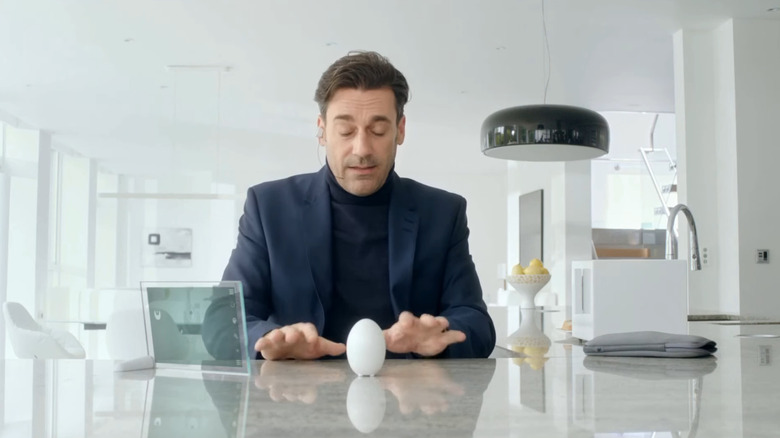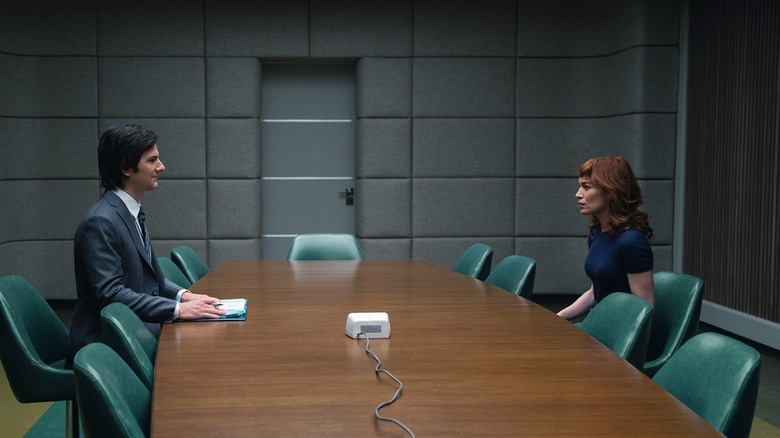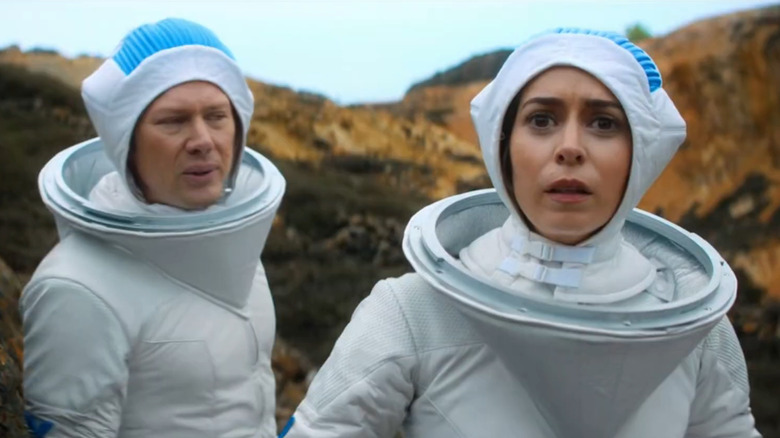Why Black Mirror Creator Charlie Brooker Won't Watch Severance
They say that one of the best things a fiction writer can do is read and watch as much fiction as they can, to learn from what other artists in the field are doing. This is good advice 99.9% of the time, but Charlie Brooker's relationship with "Severance" might be that rare exception. Brooker is the creator and ongoing showrunner of "Black Mirror," a TV show that's long explored some very "Severance"-esque concepts. He's spoken in a recent interview about his refusal to watch the hit Apple TV+ series:
"There's certainly a show I haven't watched that's made me jealous. People keep telling me to watch 'Severance,' and I haven't let myself do it because they also say to me, 'Oh, you'll love it. It's a bit 'Black Mirror'-y, but it's much better.'"
It's easy to see Brooker's reasoning. Not only is "Severance" a similar show, but it's currently enjoying a massive wave of critical acclaim and popularity, something "Black Mirror" enjoyed in the 2010s but not so much today. "Black Mirror" may have been the hip new show in its first two or three seasons, but now the prevailing cultural sentiment is that it's out of ideas or that it's gotten too soft and American. There's a good chance that the tide will turn on "Severance" as well one day — the tide comes for all popular things eventually — but right now "Severance" is on top of the world and "Black Mirror" isn't.
'Black Mirror' inspired 'Severance,' and possibly vice versa
In a 2022 interview with The New York Times, "Severance" showrunner Dan Erickson talked about watching the devastating "Black Mirror" episode "White Christmas," which introduces the concept of digital consciousness for the first time in the series. There, the digital consciousnesses are called cookies; they have the personality and memories of their original selves, but they're burdened with the knowledge that they're not officially real and they don't have any rights. And because they exist within computers, not the real world, their owners are able to manipulate their sense of time. In one of the episode's most disturbing scenes, Jon Hamm's character casually adjusts the settings so that the person trapped in the computer has to experience several months of endless consciousness, with not a single thing to do to pass the time.
"I remember feeling so cold and afraid after seeing that, this devastating idea of having to experience this endless solitude," Erickson said. "It's this nightmare of running out a door and then you're just running back in, and you realize you're truly stuck in this liminal space with this kind of nightmare logic." He talked about how that terrifying "White Christmas" scene directly influenced the opening sequence of the first episode of "Severance." When Helly is learning about how she's not a "real" person, that she only exists to work in perpetuity, there's a similar pervasive sense of existential horror.
There are of course some key differences between the two concepts, the main one being that the severed people (or innies) in "Severance" are still physical beings, not digital consciousnesses. So, when they do rebel (as we see in the season 2 finale) they have more opportunities to fight back at their oppressors. "Severance" also benefits from not being an anthology show, which gives it the chance to really dive into the differences between these separate consciousnesses. "Severance" has had 20 episodes and counting to properly dive into the question of what qualifies as a soul, whereas "Black Mirror" can only tackle the question every once in a while, usually only for an hour at a time.
The USS Callister sequel may not be directly inspired by 'Severance,' but there are definitely similarities
Charlie Brooker's refusal to watch "Severance" has become more ironic with the release of "Black Mirror" season 7, which features a final episode that covers similar thematic ground. "USS Callister: Into Infinity," is filled with interactions between two physically-identical people who share the same souls. Much like how Innie and Outtie Mark didn't get along much in the season 2 "Severance" finale, the two Nanettes we follow in "Into Infinity" aren't quite as chummy as we would've hoped. Real-life Nanette isn't happy about the whole blackmail situation that played out in the first "USS Callister" episode, and Digital Nanette is a little envious that real Nanette's gotten to enjoy a comfortable life this whole time.
Even more interesting is the dynamic between digital Walton (Jimmi Simpson) and real-life Walton, a dynamic that seems awfully similar to Helly and Helena's dynamic in "Severance." Real-life Walton is a selfish CEO who doesn't see the digital people as humans, whereas Digital Walton is a genuine friend to the rest of the digital crew. It makes for a fascinating case study in the nature vs. nurture debate. As much as we like digital Walton, our support for him is complicated by what we know real-life Walton's capable of. And just as we hate real-life Walton, we can't hate him too much because we know there's goodness somewhere in his soul.
"Severance" still wins out in this comparison, if only because it's had way more time to explore its Helly/Helena dynamic than "Into Infinity" has with Walton. If the "Black Mirror" sequel episode was allowed to be longer, there could've been a really juicy subplot where real-life Walton tempted digital Walton with some sort of power. Just as digital Nanette was tempted with the possibility of abandoning the crew to escape into her real body, maybe digital Walton could've been tempted somehow too, in a way that put to the test just how much his experience in the game had changed him.
Alas, "Into Infinity" doesn't have time to explore that question, whereas "Severance" has all the time in the world. Charlie Brooker might not be enjoying "Severance," but if you wanted more from Walton's character(s) in "Black Mirror," the Apple TV+ series is a definite must-see.


